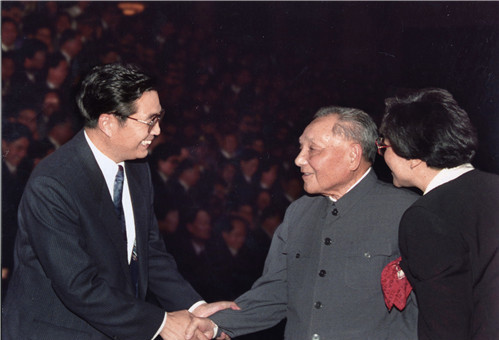 |
|
[Photo/people.cn]
|
When the People's Daily published an article criticizing Deng for choosing the path of capitalism (accusations were also thrown at Liu Shaoqi) on April 1, 1967, a time when the "Gang of Four" were doing all they could to persecute some veteran leaders, Deng was shocked and felt that the criticism towards him had escalated to the point that there might be some very serious consequences.
Two days later, he wrote a letter to Mao expressing his urgent desire to meet with Mao in person and hear Mao's opinion on the subject. The letter, a signal that he was trying to establish closer relations with Mao, can be seen as a reversion of people's previous ideas about Deng's aloof attitude toward Mao and his philosophy, which according to the Deng Xiaoping Biography was one of the main reasons behind Mao's dissatisfaction with Deng for a time.
"Some things that Mao Zedong said (such as 'since 1959, he never came to me,' or 'he always sat far from me when we had meetings') reflected the estrangement between Mao and Deng. One of the reasons behind this estrangement was their disagreement on some important issues," the Deng Xiaoping Biography notes. "Especially when Mao mobilized the Cultural Revolution, Deng was very negative about it, even creating obstacles on several occasions."
Despite this distance between the two, starting from that letter Deng made it a habit to frequently write letters to Mao. This active communication, during which Mao would sometimes even write back, was most likely one of the reasons Mao later maintained a relatively lenient and even sometimes protective attitude toward Deng, which didn't just prevent him from suffering the same fate as Liu Shaoqi (who died while under house arrest in 1969), but also made it possible for Deng to re-emerge (for the 3rd time) later in his political life.
"Deng's experience of 'three downs and ups' also embodies the deep ideological struggle inside the Party," said Yang. "That's a difference separating the CPC and other political parties. Without such positive inner ideological struggles, the Party will lose its energy," he told the Xinhua News Agency.
Just the facts
Biographies about significant historical figures about Mao Zedong and Zhou Enlai have emerged not just in China but also abroad, such as the two above mentioned books by foreign authors, which have actually been very influential in the country.
Other books such as Mao: A Biography by US scholar Ross Terrill, as well as Zhou Enlai: A Biography by British writer Dick Wilson have all influenced foreign readers' ideas about these Chinese history-making figures.
However, while they offer very vivid and fresh perspectives by incorporating the writers' personal understanding and opinions, these books sometimes fail to paint a complete picture due to their lack of access to certain historical details.
This may be one of the reasons why the publication of official biographies of former leaders have increased in recent years. Though less entertaining than some opinionated biographies, these serious official biographies serve a more documentary function that helps contribute to piecing together a clearer and bigger picture of history that can stand alongside other nonofficial biographies.
We Recommend:
